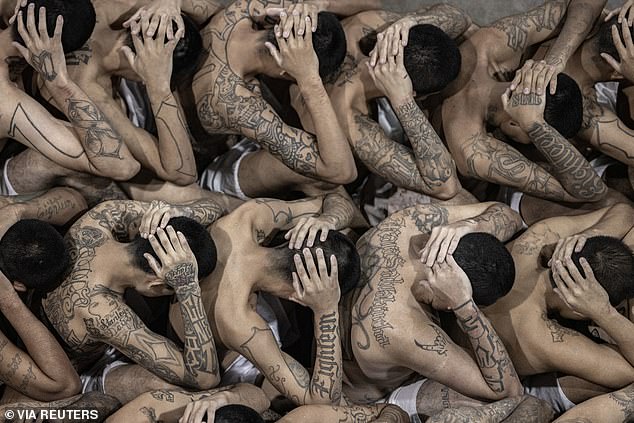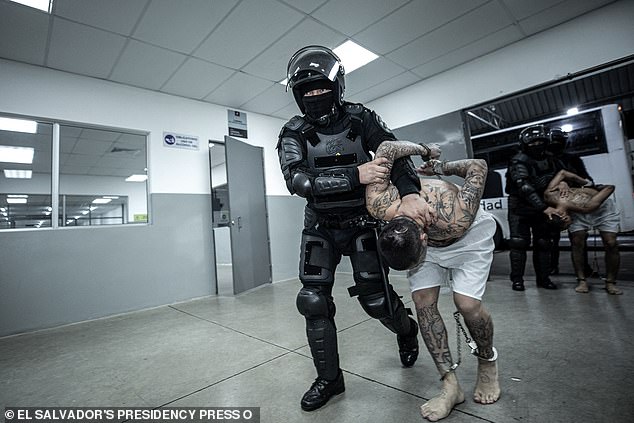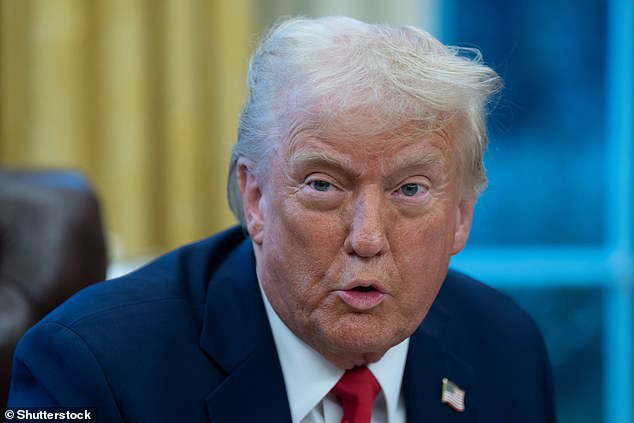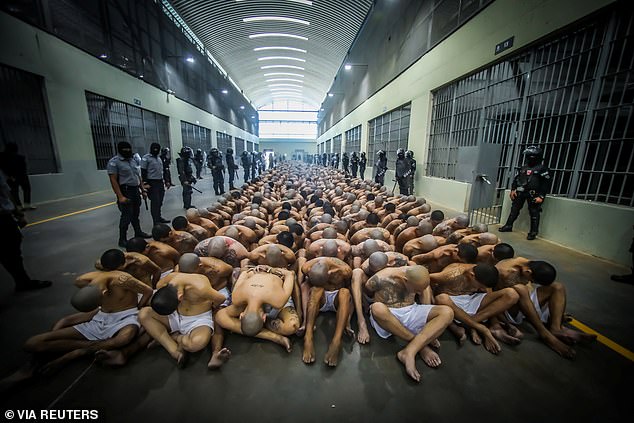A prison complex in El Salvador housing some of the country’s most notorious gang members could end up taking in deportees from the United States as well as violent criminals currently imprisoned in the U.S.
The offer was made by El Salvador President Nayib Bukele during a meeting with Secretary of State Marco Rubio on Monday, according to State Department spokesperson Tammy Bruce.
Bukele agreed to accept Salvadoran MS-13 gang members who unlawfully entered the US as part of President Donald Trump‘s mass deportation plan.
He also guaranteed Rubio that El Salvador would receive and jail violent undocumented immigrants from any country, including members of the feared Venezuelan Tren de Aragua street gang.
The future inmates, including U.S. citizens and permanent residents, would be incarcerated at the Centro de Confinamiento del Terrorismo (Terrorism Confinement Center), located in a remote area about 44 miles southeast of the country’s capital, San Salvador.
‘We have offered the United States of America the opportunity to outsource part of its prison system,’ Bukele wrote his X account.
‘We are willing to take in only convicted criminals (including convicted U.S. citizens) into our mega-prison (CECOT) in exchange for a fee.
‘The fee would be relatively low for the U.S. but significant for us, making our entire prison system sustainable.’




The $100 million penitentiary, the largest in Latin America, was constructed over a span of seven months in 2022 as part of Bukele’s plan to reign in street gangs after more than 60 people were murdered on March 26, 2022.
The following day, Bukele declared a State of Exception, which granted powers to the police and military as alleged gang members, including those belonging to the MS-13 and Barrio 18, were rounded up in raids without court orders and stripped away rights such as freedom of assembly and communication privacy.
The Terrorism Confinement Center is located on 410 acres of land, including 57 that were set aside to build eight pavilions surrounded by a 36-foot-tall and 1.3-mile-long wall.
It houses at least 13,000 inmates, with a capacity for 40,000, eclipsing the Marmara Penitentiaries Campus in Istanbul, Turkey.
‘El Salvador has managed to go from being the world’s most dangerous country, to the safest country in the Americas,’ Bukele said three weeks before the prison opened in late February 2023.
‘How did we do it? By putting criminals in jail. Is there space? There is now.’
The mega-prison is equipped with a system that blocks inmates from contacting the outside world with cellphones.
To enter the jail, staffers, guards and prisoners have to go through a complex registration system before they travel through three sections safeguarded by gates.





Jails cells with steel bars are split among the eight cell blocks and can hold up to 100 detainees.
Each cell comes equipped with 80 bare iron bunks – mattresses are not included – along with two toilets and two sinks.
Every pavilion also has its own windowless cell where unruly prisoners are sent.
Gang members spend 23 and a half hours locked in their overcrowded cells, with just 30 minutes to stretch – chained in the middle of the hallway.
Within the cells, the temperature can reach a staggering 95 degree during the day, and there is no other source of ventilation.
Stunning images taken from within the complex usually show inmates shirtless in white shorts as they attempt to keep cool.
Dubbed a ‘black hole of human rights’ by critics, the facility has drawn widespread condemnation for allegedly ignoring international prisoner rights.
Miguel Sarre, a former member of the UN Subcommittee for the Prevention of Torture, slammed the facility as a ‘concrete and steel pit.’


Yet in a country plagued by violent gangs like MS-13 and Barrio 18, Bukele’s heavy-handed approach has turned him into a national hero.
For many Salvadorans, the high-security prison isn’t a disgrace – it’s a symbol of safety and hope, driving the president’s soaring popularity and political dominance.
Human rights activists have warned that El Salvador lacks a consistent policy for the treatment of asylum seekers and refugees and that an agreement between the country and the US might not be limited to violent criminals.
Manuel Flores, the secretary general of the leftist opposition party Farabundo Martí National Liberation Front, criticized any such plan, saying it would signal that the region is Washington’s ‘backyard to dump the garbage.’
Critics of the idea expressed dismay at Bukele’s offer.
‘Incentivizing imprisonment by turning it into a for-profit business is a terrible idea. Too easily corruptible,’ one person replied to the president’s statement on the matter. ‘Now add sending people to another country (to likely never be heard from again) and the idea becomes even uglier and more politicized.’
Others were more receptive.
‘Fantastic Idea,’ one wrote. ‘This could prove to be a further deterrent to career criminals and career petty criminals, who often aren’t worried about spending a few months in the local pen,’ they wrote. ‘Use a 3-strike policy. I bet you’d think twice about shoplifting or vandalizing again.’
